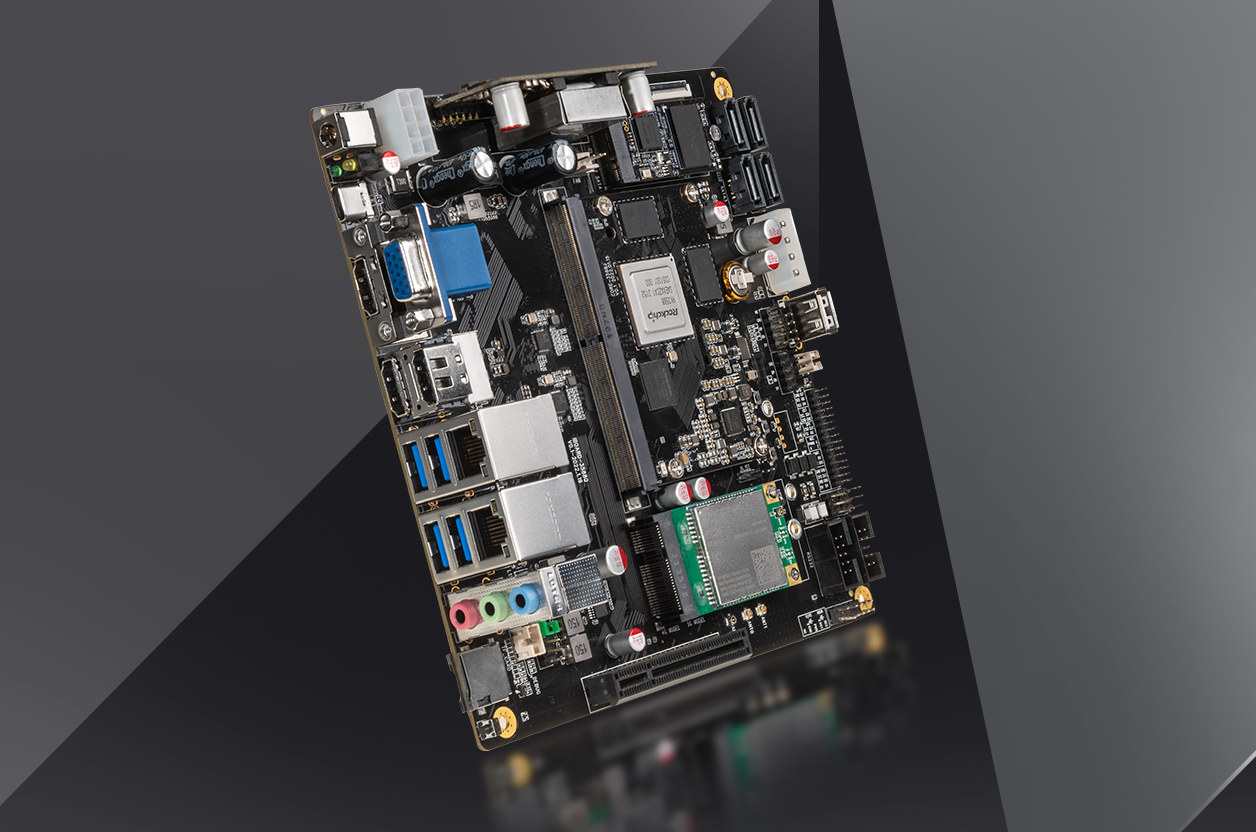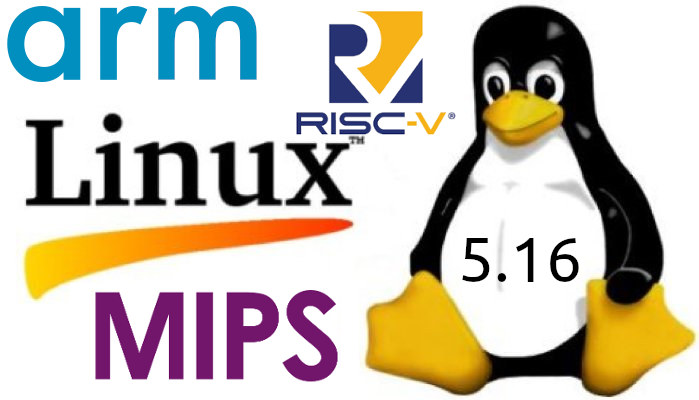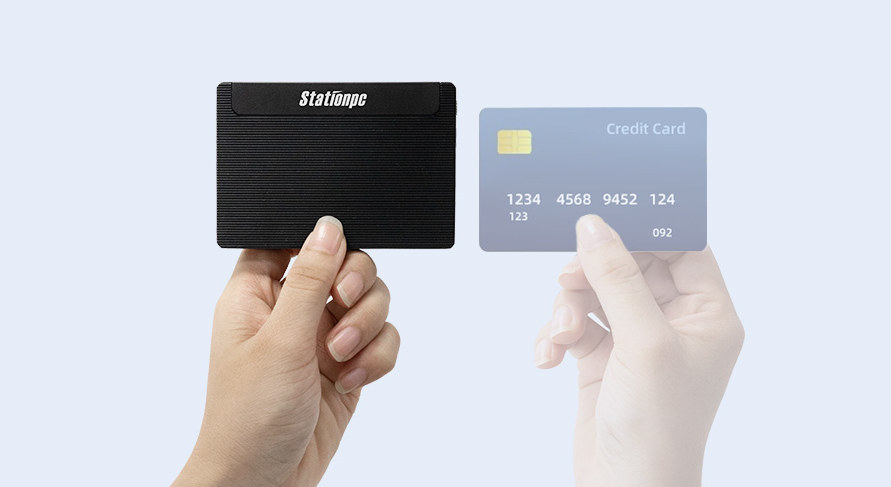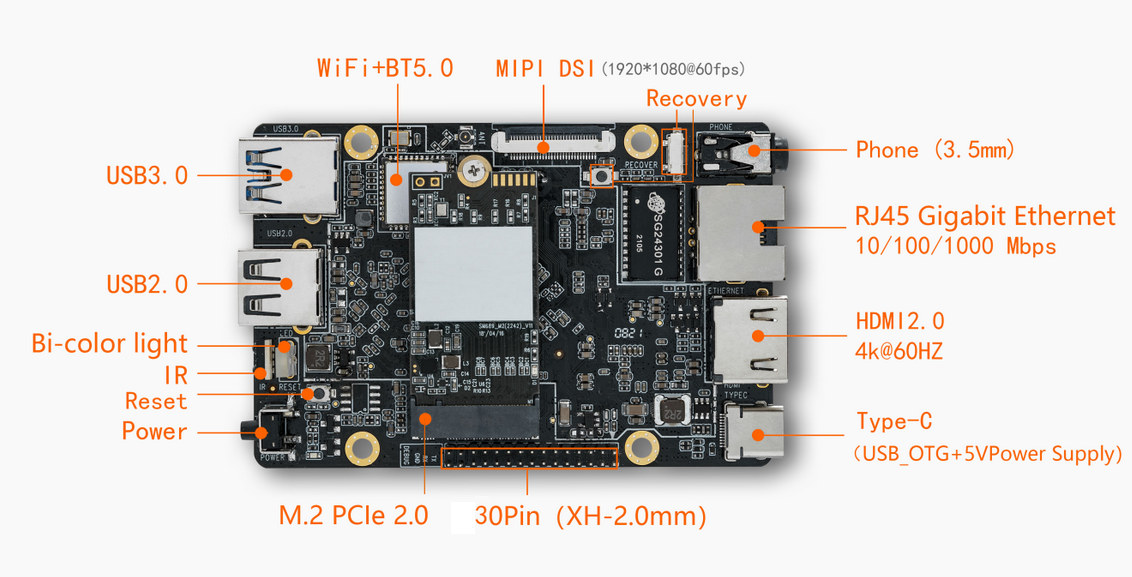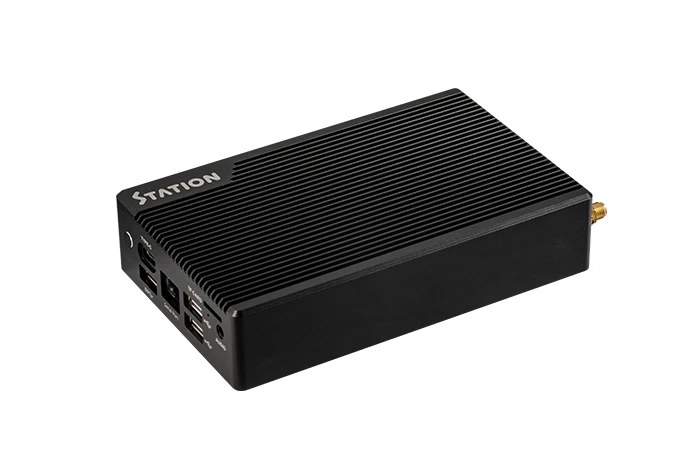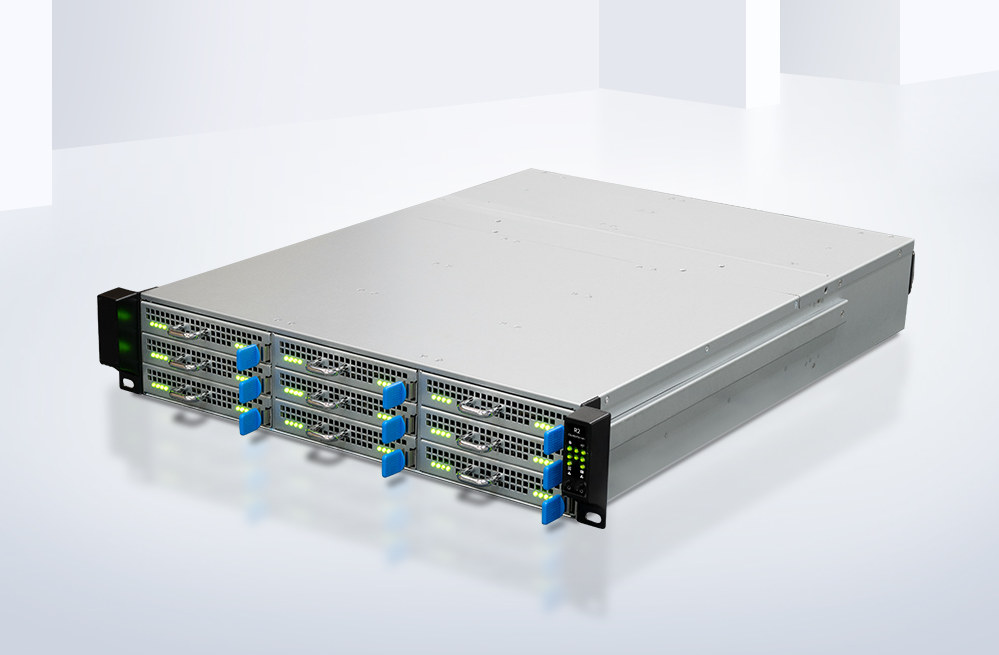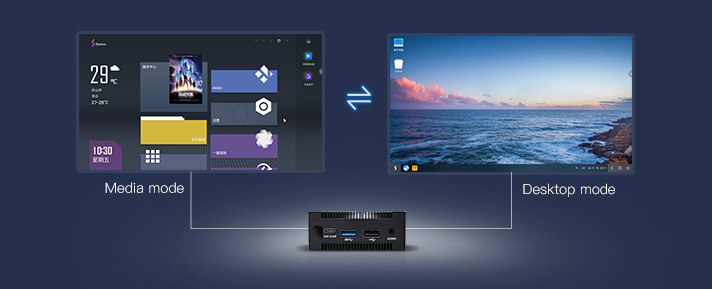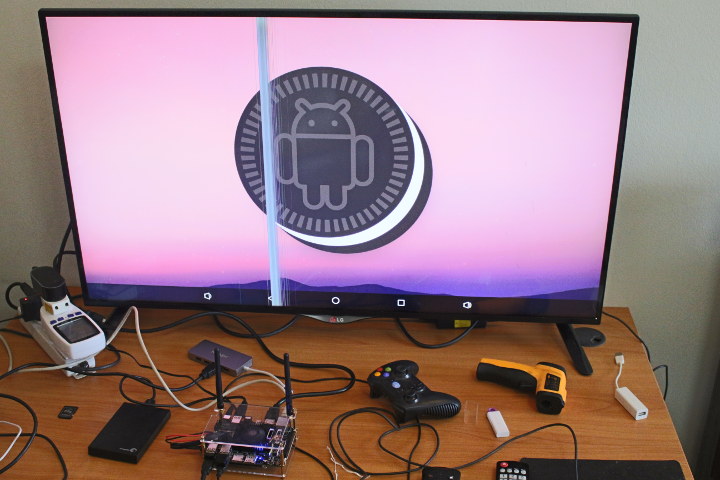After Radxa ROCK5 Pico-ITX SBC and Banana Pi RK3588 SoM and devkit, Firefly ITX3588J mini-ITX motherboard is the third hardware platform we’ve seen with Rockchip RK3588 octa-core Cortex-A76/A55 processor. The board will be interesting to people wanting an Arm PC or workstation as the mini-ITX form factor will allow the board to be fitted to a standard enclosure, and there’s plenty of resources and I/Os with up to 32GB RAM, four SATA ports, multiple 8K/4K video outputs and inputs, dual Gigabit Ethernet, WiFI 6 and Bluetooth 5.0, a PCIe 3.0 x4 slot, and more. Firefly ITX3588J mini-ITX motherboard specifications: SoC – Rockchip RK3588 octa-core processor with four Arm Cortex-A76 cores @ up to 2.4 GHz, four Arm Cortex-A55 cores, ArmMali-G610 MP4 quad-core GPU with support for OpenGL ES3.2, OpenCL 2.2, Vulkan1.1, 6 TOPS NPU, 48MP ISP, 8Kp60 video decoding, 8Kp30 video encoding System Memory – 4GB, 8GB, 16GB, or 32GB […]
Linux 5.16 Release – Main Changes, Arm, RISC-V and MIPS architectures
Linus Torvalds has just announced the release of Linux 5.16: Not a lot here since -rc8, which is not unexpected. We had that extra week due to the holidays, and it’s not like we had lots of last-minute things that needed to be sorted out. So this mainly contains some driver fixes (mainly networking and rdma), a cgroup credential use fix, a few core networking fixes, a couple of last-minute reverts, and some other random noise. The appended shortlog is so small that you might as well scroll through it. This obviously means that the merge window for 5.17 opens tomorrow, and I’m happy to say I already have several pending early pull requests. I wish I had even more, because this merge window is going to be somewhat painful due to unfortunate travel for family reasons. So I’ll be doing most of it on the road on a laptop […]
Station M2 business-card sized Android 11 mini PC, also supports Ubuntu & Buildroot
After introducing Station P2 Rockchip RK3568 mini PC in March of this year, Firefly has now launched another, cheaper model with the ultra-thin Station M2 computer based on the company’s ROC-RK3566-PC single board computer equipped with Rockchip RK3566 SoC. Station M2 is only slightly larger than a business card, but packs up to 8GB RAM, M.2 SSD storage, HDMI 2.0, Gigabit Ethernet, and USB 3.0/2.0 ports. Station M2 specifications: SoC – Rockchip RK3566 with a quad-core Cortex-A55 processor @ up to 1.8GHz. Arm Mali-G52 2EE GPU with support for OpenGL ES 1.1/2.0/3.2. OpenCL 2.0. Vulkan 1.1, 0.8 TOPS AI accelerator, 4K H.265/H.265/VP9 video decoder, 1080p100 H.265/H.264 video encoder. System Memory – 2GB or 4GB LPDDR4 (8GB optional) Storage – 32GB or 64GB (128GB eMMC optional), M.2 PCIe 2.0 socket for 2242 NVMe SSD, MicroSD card socket Video Output – 1x HDMI port up to 4Kp60 Audio – 3.5mm headphone jack, […]
ROC-RK3566-PC single board computer supports up to 8GB RAM, M.2 NVMe SSD’s
Firefly has now launched a Rockchip RK3566 single board computer named ROC-RK3566-PC, following the launch of Station P2 RK3568 mini PC on Indiegogo last March, and the completion of the campaign a few days ago. The quad-core Cortex-A55 SBC supports up to 8GB ECC memory, up to 128GB flash, M.2 2242 MVMe SSD’s, HDMI 2.0 and MIPI DSI video interfaces, Gigabit Ethernet, and more. ROC-RK3566-PC specifications: SoC – RockChip RK3566 quad-core Cortex-A55 @ up to 1.8GHz with Arm Mali-G52 2EE GPU with support for OpenGL ES 1.1/2.0/3.2. OpenCL 2.0. Vulkan 1.1, 0.8 TOPS NPU, 4Kp60 H.265/H.264/VP9 video decoder System Memory – 2GB, 4GB, or 8GB LPDDR4 RAM with support for “all-data-link ECC” (TBC: Because the info I have so far is that ECC is supported on RK3568, not on RK3566) Storage 32GB, 64GB, or 128GB eMMC flash M.2 PCIe 2.0 socket for M.2 2242 NVMe SSD MicroSD card slot Video […]
Station P2 Arm mini PC offers dual GbE, M.2 & SATA SSD, up to 8GB RAM (Crowdfunding)
Last week, we noted Firefly launched the first RK3568 system-on-module with Core-3568J AI Core and a corresponding full-featured development kit. But the company has been working on another interesting Rockchip RK3568 based device with Station P2 mini PC. Most Arm mini PCs need to make compromises when it comes to interfaces having to rely on USB bridges, but Station P2 feels very much like standard x86 based mini PC, albeit with a slower processor, thanks to native interfaces, or implemented through PCIe, with M.2 and SATA 3.0 SSD/HDD, dual Gigabit Ethernet, as well as WiFi 6, several USB 3.0/2.0 ports, and support for up to 8GB RAM among other features. Station P2 mini PC specifications: SoC – Rockchip RK3568 quad-core Cortex-A55 processor @ up to 2.0 GHz with Arm Mali-G52 2EE GPU with support for OpenGL ES 1.1/2.0/3.2, OpenCL 2.0, Vulkan 1.1, 0.8 TOPS NPU for AI acceleration, 4Kp60 H.265/H.264/VP9 […]
Cluster Server R2 2U rack cluster server ships with up to 72 Rockchip RK3399/RK3328 SoMs
Rockchip RK3399 and RK3328 are typically used in Chromebooks, single board computers, TV boxes, and all sort of AIoT devices, but if you ever wanted to create a cluster based on those processor, Firefly Cluster Server R2 leverages the company’s RK3399, RK3328, or even RK1808 NPU SoM to bring 72 modules to a 2U rack cluster server enclosure, for a total of up to 432 Arm Cortex-A72/A53 cores, 288 GB RAM, and two 3.5-inch hard drives. Firefly Cluster Server R2 specifications: Supported Modules Core-3399-JD4 with Rockchip RK3399 hexa-core Cortex-A72/A53 processor up to 1.5 GHz, up to 4GB RAM, and optional on-board 2.8 TOPS NPU (Gyrfalcon Lightspeeur SPR5801S) Core-3328-JD4 with Rockchip RK3328 quad-core Cortex-A53 processor up to 1.5 GHz, up to 4GB RAM Core-1808-JD4 with Rockchip RK1808 dual-core Cortex-A35 processor @ 1.6 GHz with integrated 3.0 TOPS NPU, up to 4GB RAM Configuration – Up to 9x blade nodes with 8x […]
Station P1 & M1 fanless mini PCs run media or desktop-optimized Android OS
T-Chip has recently introduced two fanless “Geek” mini PCs under their Firefly brand with Station P1 & M1 respectively powered by Rockchip RK3399 hexa-core processor, and RK3328 quad-core processor. Both mini PCs can run Firefly’s Station OS in either desktop or media mode, as well as Android or Ubuntu. There are also some community efforts to port Armbian and LibreELEC to the devices. Station P1 specifications Specifications: SoC – Rockchip RK3399 hexa-core processor with two Cortex A72 cores @ up to 1.8 GHz and four Cortex-A53 cores, Mali-T860 MP4 GPU with support for OpenGL ES1.1/2.0/3.0/3.1, OpenVG1.1, OpenCL, DX11, VPU with support for 4K H.265 10-bit 60fps video decoding, multi-channel 1080p video decoding and encoding System Memory – 4GB LPDDR4 dual-channel 64-bit RAM Storage – 32GB eMMC flash (16GB/64GB/128GB Optional), onboard 16MB SPI flash, MicroSD card slot Video Output HDMI 2.0a up to 4Kp60, HDCP 1.4/2.2 DisplayPort 1.2 up to 4Kp60 […]
Review of Firefly-RK3399 Board with Android 8.1 Firmware
Last week, I tested Android 7.1 on NanoPC-T4 Rockchip RK3399 SBC, and this week, I’ve given a try at Android 8.1 (Beta) on Firefly-RK3399 Board. Since it’s still a beta version, I’m expecting some issues and we’ll have to see how it performs at this stage of development. Firefly-RK3399 Kit Assembly I had to do some assembly before starting the board. It took me some 30 minutes to complete, so I’ll quickly go through the steps. Beside the default kit, the company also sent me a fansink ($7.9) and an M.2 to SATA board + required cable ($16) which will be part of the assembly instructions. The first step is to peel off the protective films on both sides of the acrylic case. I then fastened my own 2.5″ hard drive with four screws provided in the default kit. I then installed the M.2 to dual SATA adapter board in […]


